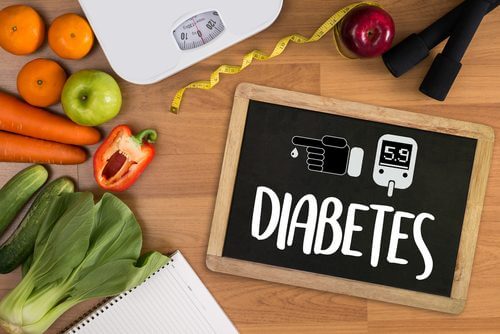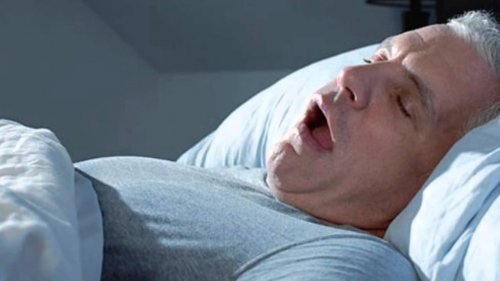Diabetes and Sleep Problems, a Very Common Relationship


Written and verified by psychologist Valeria Sabater
Did you know that oscillations in blood sugar levels may be behind sleep problems and lack of rest? Diabetes and sleep problems are related.
This is, without a doubt, a problem that is not widely discussed. Nevertheless, it affects a good part of the population who suffer from diabetes.
Sleep disorders are common in people with type 2 diabetes, and usually manifest themselves in various ways.
These can range from classic restless legs to sleep apnea or the increased need to go to the bathroom at this time of night.
All these factors lead to bad rest, daytime fatigue and even to an intensification of the disease itself.
It’s therefore necessary to bear in mind these kinds of problems and symptoms in order to consult with your doctor. In reality, the treatment for these types of nocturnal disorders may be easier than you think.
Below, we’ll offer you all the information.
Diabetes and sleep problems: what kind of link exists?

As we already know, diabetes is a disease in which the body has difficulty producing an adequate level of insulin on its own.
This results in glucose peaks that are, without a doubt, very dangerous.
In type 1 diabetes, it is the pancreas that can’t produce insulin. In type 2 diabetes, however, what happens is that, although our body can produce it, it doesn’t do so at an optimal level.
Interestingly, there tend to be greater sleep disorders in patients with type 2 diabetes, mainly due to these oscillations in sugar levels.
Let’s take a took at what kind of problems usually arise and their origins.
Discover 8 Foods to Naturally Fight Insomnia
Excessive urination at night
Diabetes and sleep problems are related in a variety of ways, but the most common is when a person is feels the need to get up 2 to 3 times to go to the bathroom or to drink water.
High levels of blood sugar make us feel a greater urgency to go urinate.
When our body has an elevated blood glucose level, it usually extracts water from the tissues. Soon, we feel dehydrated, so we need to drink.
Upon drinking 1 or 2 glasses of water at night, then we will feel more need to go to the bathroom. It’s a cycle!
Likewise, we can’t forget that a low blood sugar level coincides with malaise, dizziness and sweating. This affects the quality of our rest.
Sleep apnea

However, the origin of this is usually in weight problems. It is common for people with type 2 diabetes to suffer from obesity.
This causes the chest to have more pressure and thus restricts the passage of air during nighttime breathing.
Snoring is not always safe. On this, we must be clear. Diabetes and sleep problems are related and, therefore, we must remember that anyone who snores at night may be suffering from more serious health problems.
Don’t forget that apneas mean a transitory cessation of breathing. Therefore, in cases where snoring is frequent, we suffer from a lower concentration of oxygen in the blood.
Restless Leg Syndrome
It’s possible that it is difficult for us to associate restless leg syndrome with diabetes. However, the link is closer than you might think.
This nocturnal disorder usually has several possible causes including iron deficiency, high levels of glucose in the blood and kidney problems.
If, in addition, you’re a smoker, the likelihood of having restless leg syndrome increases.
Thus, it’s essential that you get periodic checks with your doctor.
Sometimes, something as common as having a bit of anemia can further intensify your problems with diabetes by developing this syndrome.
Discover also The 6 Best Teas to Help You Sleep
How to improve your rest if you suffer from type 2 diabetes

Take note on how to improve your sleep habits with these simple guidelines.
Your diet
- To improve the quality of your rest and avoid having to go to the bathroom at night, for example, it’s a good idea to drink less liquids before going to bed.
- Avoid stimulant drinks such as caffeine, certain shakes or infusions.
A little exercise in the afternoon
- Practicing exercise on a regular basis improves the quality of your rest.
Avoid electronic devices
- Two hours before going to bed, it’s a good idea to set aside cell phones, laptops, tablets …
- These devices overactive your brain and affect the quality of our sleep.
Yes to schedules
It’s necessary to always try to follow the same schedules as much as possible: eat at the same times, go to bed during the same time slot, etc.
These guidelines and these routines allow us to better adjust our circadian rhythms and with them, our health and rest noticeably.
Periodic medical checks
Since diabetes and sleep problems have an intimate relationship, it never hurts to remember the importance of consulting a doctors about any question, problem or symptom that you experience.
Plus, don’t forget those important periodic check-ups for monitoring diabetes and also for taking care of your weight, possible nutritional deficiencies, heart health, etc.
All these factors are also related to your rest, so try to improve your quality of life. Take care of yourself so that diabetes doesn’t affect your quality of life. It’s worth it!
All cited sources were thoroughly reviewed by our team to ensure their quality, reliability, currency, and validity. The bibliography of this article was considered reliable and of academic or scientific accuracy.
- Depner, C. M., Stothard, E. R., & Wright, K. P. (2014). Metabolic consequences of sleep and circadian disorders. Current Diabetes Reports. https://doi.org/10.1007/s11892-014-0507-z
- Sehgal, A., & Mignot, E. (2011). Genetics of sleep and sleep disorders. Cell. https://doi.org/10.1016/j.cell.2011.07.004
- Vgontzas, A. N., Liao, D., Pejovic, S., Calhoun, S., Karataraki, M., & Bixler, E. O. (2009). Insomnia with objective short sleep duration is associated with type 2 diabetes: A population-based study. Diabetes Care. https://doi.org/10.2337/dc09-0284
- Ban, H. J., Kim, S. C., Seo, J., Kang, H. B., & Choi, J. K. (2011). Genetic and Metabolic Characterization of Insomnia. PLoS ONE. https://doi.org/10.1371/journal.pone.0018455
This text is provided for informational purposes only and does not replace consultation with a professional. If in doubt, consult your specialist.








